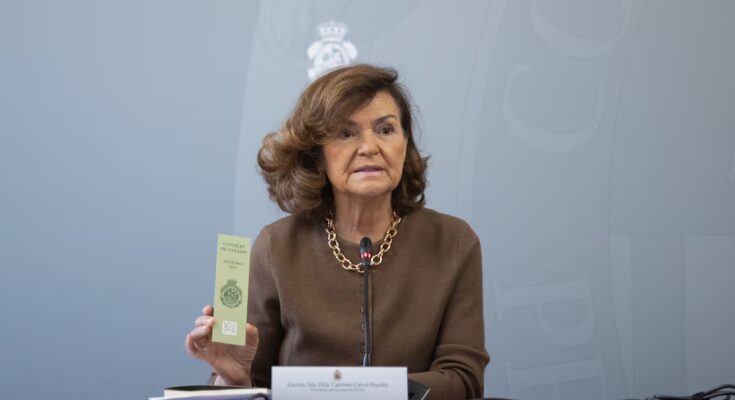Electricity companies are preparing their weapons before fighting the last battle in the war they are fighting against the National Commission for Market and Competition (CNMC) to try to obtain a definitive improvement in the remuneration they will charge for their networks over the next six years, deriving revenue from the bill that all consumers will pay. The regulator’s latest proposal provides for the financial remuneration rate to be 6.58%, far from the 7.5% requested by the companies that own the low voltage lines.
With these differences, Aelec (association representing Iberdrola, Endesa and EDP) turned to the Council of State to have its arguments taken into consideration. The advisory body is the last to give its mandatory opinion on the remuneration circulars before they return to the CNMC for final approval, which must take place before December 31.
At the moment, sources familiar with the procedure assure that the CNMC has already sent the dossier to the Ministry of Economy, which will then be the one to carry out the transfer to the Council of State, which has not yet happened. The votes against the directors who expressed disagreement with the proposal approved by the majority must be included in this file.
The sources consulted indicate that two directors (Josep María Salas and María Jesús Martín) have prepared individual votes because they believe that there are issues that need to be taken into account and which translate into a slightly more generous remuneration for the electricity companies. On the contrary, Councilor Carlos Aguilar asks to lower the TRF from 6.58% to 6.46% of the initial proposal of the CNMC.
Power companies will be able to assert these discrepancies within the CNMC in their favor before the consultative body during the proceedings that will be opened at the State Council, industry sources say. Furthermore, there are two other councilors (Vice President Ángel García Castillejo and Pilar Sánchez) who would be closer to the theses of the dissenting councilors than to the majority led by President Cani Fernández, who supports the work of the technical services led by Energy Director Rocío Prieto. However, neither García nor Sánchez cast any dissenting votes.
Now there are those who believe that the pressure is concentrated on the two Basque councilors, Enrique Monasterio and Rafael Iturriaga. Both have so far positioned themselves clearly with the proposal supported by the majority. However, there is pressure from the Basque government to try to influence the CNMC in favor of improving the networks’ remuneration.
Both the Basque Lehendakari and Imanol Pradales and other regional officials expressed the need to ensure investments in networks in their territory given the high level of saturation of networks in the three Basque provinces, which could affect the future developments of their industry, which is fundamental to the economy of this territory. No one ignores the strong influence that Iberdrola exercises in the Basque Country: it is the main taxpayer of the provincial treasury and one of those that generates the most jobs through the subcontracting of Basque industrial companies. But the Basque councilors, elected on the proposal of the PNV and the PSOE, are independent and do not depend hierarchically on anyone.
In this panorama, electricity companies are aware that the report prepared by the State Council has a limited impact on the CNMC, since its opinion is not binding. But they believe this could influence the regulator’s final decision, which is why they are present in person. Until then, informal contacts with members of the Council of State, chaired by former vice-president of the Government Carmen Calvo, are taken for granted.
Meanwhile, the sources consulted indicate that there is some surprise among some CNMC advisors because the Government has not convened the Cooperation Commission, a legal prerogative available to the Ministry for Ecological Transition with which it forces the CNMC and its advisors to sit down to convince it of its arguments.
As reported by these media, the department led by the third vice-president and minister of the sector, Sara Aagesen, made some important comments in the opinion report on the remuneration circulars which indicate a certain improvement in remuneration with the aim of complying with its energy policy guidelines, the objective of which is decarbonisation for the economy, which requires ensuring investments in electricity networks.
However, both the ministry and the CNMC are aware that an excessive increase in the financial remuneration rate for the next six years may make the electricity bill more expensive than it should be, which affects the competitiveness of the sector, an effect that could generate rejection from potential investors. Furthermore, this increase in prices impacts consumers’ pockets, another undesirable effect due to what implies an increase in inflation. The remuneration framework that will be approved remunerates not only the new networks, but also all the assets already operational.
In this context, and although the Government’s report requires some improvement in some concepts of the circulars, the Executive decided to avoid an institutional conflict with the CNMC and avoided the bilateral meeting, as it had done for several circulars in 2020, the previous regulatory period. Perhaps the pressure that electricity companies exert on the regulator on other issues, such as the expansion of nuclear power or responsibilities for the blackout, also weighed on the government.



